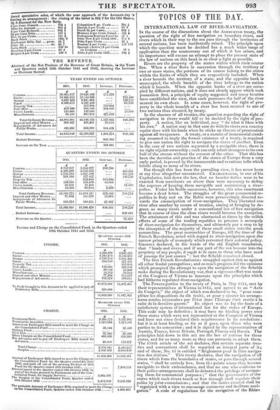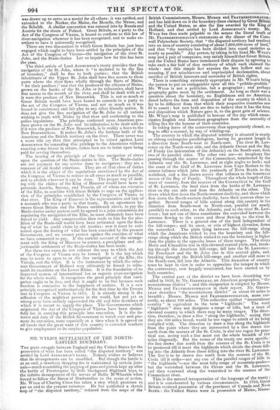TOPICS OF THE DAY.
INTERNATIONAL LAW OF RIVER-NAVIGATION. IN the course of the discussions about the Amu:wort treaty, the question of the right of free navigation on boundary rivers, and rivers which in their way to the sea pass through the territories of several nations, has been incidentally raised. The principle upon which the question must be decided has a much wider range of application than the controversy out of which it has arisen, and its importance will excuse an attempt to place the present state of the law of nations on this head in as clear a light as possible.
Rivers are the property of the states within which their course lies. When a river flows in succession through the territory of two or more states, the portions of its course belong to the states within the limits of which they are respectively included. When a river bounds the territory of a state, and the opposite bank is unoccupied, the whole breadth of the river belongs to the nation which it bounds. When the opposite banks of a river are occu- pied by different nations, and it does not clearly appear which took possession first, a principle of equity suggested and many treaties have established the view, that each possesses the half of the river nearest its own shore. In some cases, however, the right of pro- perty in the whole breadth of a river has been secured to one of two nations thus situated, by treaty.
In the absence of all treaties, the question regarding the right of navigation in rivers would fall to be decided by the right of pro- perty. A nation, like an individual, may " do what it likes with his own." A nation may in that case do with its rivers as a country squire does with his lands when he sticks up threats of prosecution against all trespassers. A treaty, or a custom of immemorial stand- ing assumed to imply the former existence of a treaty, is required to give one nation the right to navigate the rivers of another. Even in the case of two nations separated by a navigable river, there is no right ofjoint-ownership ; each can only admit strangers to its own half of the stream without the consent of the other. That this has been the doctrine and practice of the states of Europe from a very early period, is proved by the innumerable and vexatious tolls which bristle along so many of its rivers.
But though this has been the prevailing view, it has never been at any time altogether uncontested. CHARLEMAGNE, in one of his Capitularies, laid down the law, that no heavier duties were to be exacted from merchants on rivers than were necessary to defray the expense of keeping them navigable and maintaining a river- police. Under his feeble successors, however, this wise enactment became a dead letter. The struggles of the great commercial re- publics in Italy and on the Baltic were perseveringly directed to- wards the emancipation of river-navigation. They liberated one river after another by means of treaties, aiming at bringing by de- grees so many rivers under a conventional law of free navigation that in course of time the close rivers would become the exception. The attainment of this end was obstructed at times by the selfish efforts of some of the trading republics to procure a monopoly of river-navigation for themselves, and ultimately put a atop to by the absorption of the majority of these small states into the great monarchies. The great monarchies of Europe, till the time of the French Revolution, acted with regard to river-navigation upon the narrow principle of monopoly which perverted their colonial policy. Games declared, in the words of the old English translation, that "lands and rivers, and if any part of the sea become into the propriety of any people, it ought to be open to those who have need. of passage for just causes" : but the Scheldt remained closed.
The first French Revolutionists struggled against this as against all other feudal prerogatives ; and so much progress did the opinions which prompted the attempt to open the navigation of the Scheldt make during the Revolutionary war, that a vigorous effort was made at the Congress of Vienna to innovate upon the principles which had hitherto regulated river-navigation.
The Powers parties to the treaty of Paris, in May 1814, met by their representatives at Vienna in 1815, and agreed to an " Acte du Congres," the object of which was declared to be, "pour com- pleter les dispositions du dit traite' et pour y ajouter les arrange- rnens rendus necessaires par l'etat dans l'Europe keit restee A is suite de la derniere guerre." Its object was to lay the basis of a satisfactory system of international law for the states of Europe. This code may be defective ; it may have no binding power over those states which were not represented at the Congress of Vienna and have not since declared their acquiescence in its resolutions : but it is at least binding, as far as it goes upon those who were parties to its concoction ; and it is signed by the representatives of
Austria, France Great Britain, Portugal, Prussia and Russia. The principles laid down in this act are the law of nations for these states and for as many more as they can persuade to adopt them. The 118th article of the act declares, that certain separate trea- ties and conventions shall be regarded as integral parts of it; and of these, No. 15 is entitled " Reglemens pour la libre naviga- tion des rivieres." This treaty declares, that the navigation of all rivers which form the boundaries of states, or pass through several states, " shall be entirely free, from the points where they become navigable to their embouchures, and that no one who conforms to their police-arrangements shall be debarred the privilege of navigat- ing them for commercial purposes ;" that the governments of the
states which such rivers touch or flow through shall regulate their police by joint-commissions ; and that the duties exacted shall be
"regulated with a view to encourage commerce and facilitate navi- gation." A code of regulations for the navigation of the Rhinet jectiouable settlement of the Stade-duties has been made. Metis and Chaudiere rise in this elevated central plain, and, break- But these two cases do not exhaust the uses to which the Act ing through the American hill-range, fall into the St. Lawrence : of the Congress of Vienna may be turned. It is the key which the Penobscot and the St. John rise in this central plain, and, may be made to open to us the free navigation of the Elbe, the breaking through the British hill-range and another still more to Vistula, and the Oder. It is the instrument by which the reluc- the South-east, fall into the Atlantic. This formation of country taut Government of Holland may ultimately be forced to relin- must be kept in view in order to appreciate the temper in which quish its exactions on the Lower Rhine. It is the foundation of an the controversy, now happily terminated, has been carried on by improved system of international law as regards river-navigation both countries.
for the whole world. It recognizes the great principle that navi- The central part of the district we have been describing was gation ought to be free, and that it ought to be free because such called in 1816, by Mr. GREENLEAF, an American geographer, "the freedom is conducive to the happiness of nations. It is a new mountainous district " ; and this designation is adopted by Messrs. principle recognized authoritatively for the first time by the Powers M
„uman and FEATHERSTONHAUGH in their report. MT. GREEN- met in Congress at Vienna in 1815. It is already strong in the LEAF describes "the mountainous district" as about 60 miles in adhesion of the mightiest powers in the world, but not yet so breadth ; Messrs. MUDGE and FEATHERSTONHAUGH, more cor- strong as to have entirely superseded the old and false doctrines of rectly, as about 100 miles. This collective epithet "mountainous which it is meant to supply the place. The Governments which country" is equivalent to the term " highlands." The word originated the Act of the Congress of Vienna have been shame- " highlands " does not designate a range of hills, but a tract of fully lax in carrying this principle into execution. It is the in- elevated country in which there may be many ranges. The direc- terest and duty of the British Government to watch over and pro- tion, therefore, to draw a line "along the highlands," seeing that mote its extension, more especially at a time when it is agreed on they are 100 miles broad, would be too vague to admit of its being all hands that the great want of this country is extended markets complied with. The direction to draw a line along the highlands to give employment to its surplus population. from the point where they are intersected by a line drawn due



























 Previous page
Previous page